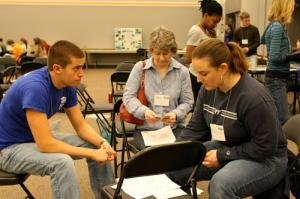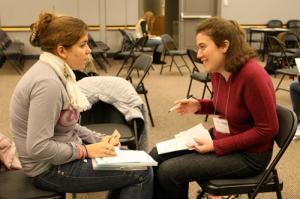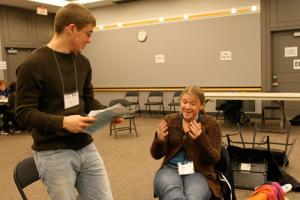Poverty Simulation Helps Interfaith Service Group Better Understand the Problems Faced by the Poor and Hungry
A group comprising TCNJ students from different faiths and denominations took part in
The Community Action Poverty Simulation run by the Trenton-based organization Crisis Ministry at Princeton University.

 November 22 was not just another lazy Saturday for several students at The College of New Jersey. A group comprising members of different faiths and denominations from TCNJ took part in a poverty simulation at Princeton University.
November 22 was not just another lazy Saturday for several students at The College of New Jersey. A group comprising members of different faiths and denominations from TCNJ took part in a poverty simulation at Princeton University.
The Community Action Poverty Simulation, run by the Trenton-based organization Crisis Ministry at Princeton University, has been run several times in the past. At the start of the simulation, students established a fictitious community with each student having a role to represent people who must live on an extremely limited budget. Roles included single mothers with multiple children to senior citizens who live alone. During the simulation, time was divided into weeks, or 15-minute segments, and the participants learned to manage their responsibilities with a limited budget. During past simulations, the last week is usually a scramble to the employment agency or pawnshop, and most “families” turn to drugs and violence.
Dan Mutter ’09, a philosophy major, was one of the participants from TCNJ. He noted how poverty can affect any person: “It meant taking time to try to see the world from a different perspective. Anyone can say they have an idea of what it’s like to be impoverished, but engaging in an experience, even if for a brief period of time and even if it’s only a simulation, gives a greater understanding to the challenges faced by many people.”
 “Through participating in the event itself and hearing the different speakers who shared their stories with the group, I learned that poverty could happen to anyone” Mutter continued. “Any judgments or antipathy against the poor are more often than not unfounded and stem from ignorance. Trying to deal with the challenges presented in the simulation, I learned that even with the education I have, it is in no way easy to meet the difficulties that face the poor.”
“Through participating in the event itself and hearing the different speakers who shared their stories with the group, I learned that poverty could happen to anyone” Mutter continued. “Any judgments or antipathy against the poor are more often than not unfounded and stem from ignorance. Trying to deal with the challenges presented in the simulation, I learned that even with the education I have, it is in no way easy to meet the difficulties that face the poor.”
TCNJ’s participation in the event was initiated by an “ongoing interfaith effort at TCNJ to promote policies and programs that support those in the greatest need,” said Lisa Canton, an Episcopal priest who is a part-time chaplain at TCNJ.
Canton met with leaders and students of other faith groups on campus, and together they asked Ceil O’Callaghan, interim associate dean of students, for help in finding a service project that would allow them to work together and build the kind of interfaith cooperation that the College would like students to bring with them when they graduate and go out into the world. Canton suggested the poverty simulation after she heard of it while researching volunteer opportunities for the Canterbury House, the Episcopal Church at TCNJ.
Students and leaders at the College also hope to establish an Interfaith Group, and its first mission would be to attend the simulation “to learn from it so that we could hold a similar event at TCNJ,” said Mutter, who is also leader of the initiative to develop the Interfaith Group at TCNJ.
 Hunger became the focus for the group due to the shared belief in the sanctity of human life and a commitment to those most vulnerable, the impoverished, and disenfranchised. “We believe that by participating in this simulation we will be better able decide the best use of our time and talent in improving the welfare of the poor and hungry,” said Canton.
Hunger became the focus for the group due to the shared belief in the sanctity of human life and a commitment to those most vulnerable, the impoverished, and disenfranchised. “We believe that by participating in this simulation we will be better able decide the best use of our time and talent in improving the welfare of the poor and hungry,” said Canton.
Posted on December 11, 2008

